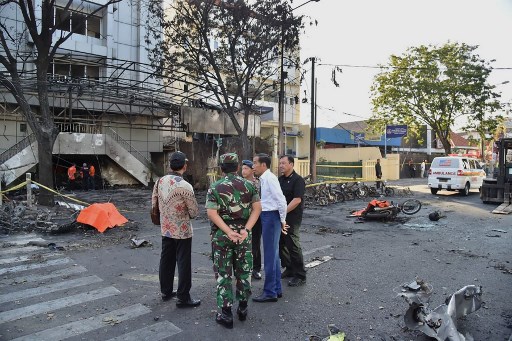
by Juni Kriswanto
Agence France Presse
SURABAYA, Indonesia (AFP) — A family of six including two young daughters staged suicide bombings at three Indonesian churches during Sunday services, killing at least 13 people and wounding dozens in attacks claimed by the Islamic State group.
The bombings at three churches in Surabaya were Indonesia’s deadliest for years, as the world’s biggest Muslim-majority country grapples with homegrown militancy and rising intolerance towards religious minorities.
A further three people were killed and two wounded when another bomb exploded at an apartment complex in Surabaya, Indonesia’s second largest city, just hours later, police said. There was no immediate claim of responsibility.
The church bombers — a mother and father, two daughters aged nine and 12, and two sons aged 16 and 18 — were linked to local extremist network Jamaah Ansharut Daulah (JAD) which supports IS, said national police chief Tito Karnavian.
Local media reports say they may have returned from Syria, where hundreds of Indonesians have flocked in recent years to fight alongside IS in its bid to carve out a caliphate ruled by strict Islamic law.
The mother, identified as Puji Kuswati, and her two daughters were wearing niqab face veils and had bombs strapped to their waists as they entered the grounds of the Kristen Indonesia Diponegoro church and blew themselves up, Karnavian said.
The father, JAD cell leader Dita Priyanto, drove a bomb-laden car into the Surabaya Center Pentecostal Church while his sons rode motorcycles into Santa Maria church, where they detonated explosives they were carrying, Karnavian said.
“All were suicide attacks but the types of bombs are different,” he said of the church attacks.
Coordinated attacks
The group, led by jailed radical Aman Abdurrahman, has been linked to several deadly incidents, including a 2016 gun and suicide attack in the capital Jakarta that left four attackers and four civilians dead.
That was the first assault claimed by IS in Southeast Asia.
Police on Sunday said four suspected JAD members were killed in a shootout during raids linked to a deadly prison riot this week.
Five members of Indonesia’s elite anti-terrorism squad and a prisoner were killed in clashes that saw Islamist inmates take a guard hostage at a high-security jail on the outskirts of Jakarta. IS claimed responsibility.
Karnavian said Sunday’s church attacks may have been revenge for the arrest of some of JAD’s leaders and for the prison crisis which eventually saw the surrender of the radical inmates.
The Pope offered support over “the severe attack against places of worship,” while President Joko Widodo called for Indonesians to “unite against terrorism.”
“The state will not tolerate this act of cowardice,” he told reporters in Surabaya.
East Java police spokesman Frans Barung Mangera confirmed the deaths of 13 people in the church bombings, with about 40 injured in the coordinated attacks around 7:30 am (0030 GMT).
Images showed a vehicle engulfed in flames and plumes of thick black smoke as a body lay outside the gate of Santa Maria Catholic church, with motorcycles toppled over amid the mangled debris.
In addition to the suicide blast police experts defused two unexploded bombs at the Surabaya Center Pentecostal church.
Later on Sunday night a bomb killed three people and wounded two, all from the same family, who occupied the fifth floor of a low-cost Surabaya apartment complex, East Java police spokesman Frans Barung Mangera said.
“Three people have died, two are in the hospital and one is safe,” he told AFP via Whatsapp.
The explosion hit the apartment complex about 9 pm, local media reported, and residents were evacuated from the building after the blast.
Yono, tenant coordinator at the apartment block, said the family had lived there since 2015.
‘Professional’ attacks
Concerns about sectarian intolerance in Indonesia have been on the rise, with churches targeted in the past.
Nearly 90 percent of Indonesia’s 260 million people are Muslim, but there are significant numbers of Hindus and Buddhists.
Police shot and wounded an IS-inspired radical who attacked a church congregation outside Indonesia’s cultural capital Yogyakarta with a sword during a Sunday mass in February. Four people were injured.
In 2000 bombs disguised as Christmas gifts and delivered to churches and clergymen killed 19 people on Christmas Eve and injured scores more across the country.
The archipelago nation of some 17,000 islands has long struggled with Islamic militancy, including the 2002 Bali bombings that killed 202 people — mostly foreign tourists — in the country’s worst-ever terror attack.
Sunday’s bombings had the highest death toll since nine people were killed in 2009 attacks on two luxury hotels in Jakarta.
Security forces have arrested hundreds of militants during a sustained crackdown in recent years that smashed some networks, and most recent attacks have been low-level and targeted domestic security forces.
But the coordinated nature of Sunday’s bombings suggested a higher level of planning, analysts said.
“Recent (previous) attacks have been far less ‘professional’,” Sidney Jones, an expert on Southeast Asian terrorism and director of the Jakarta-based Institute for Policy Analysis of Conflict, told AFP.
© Agence France-Presse







